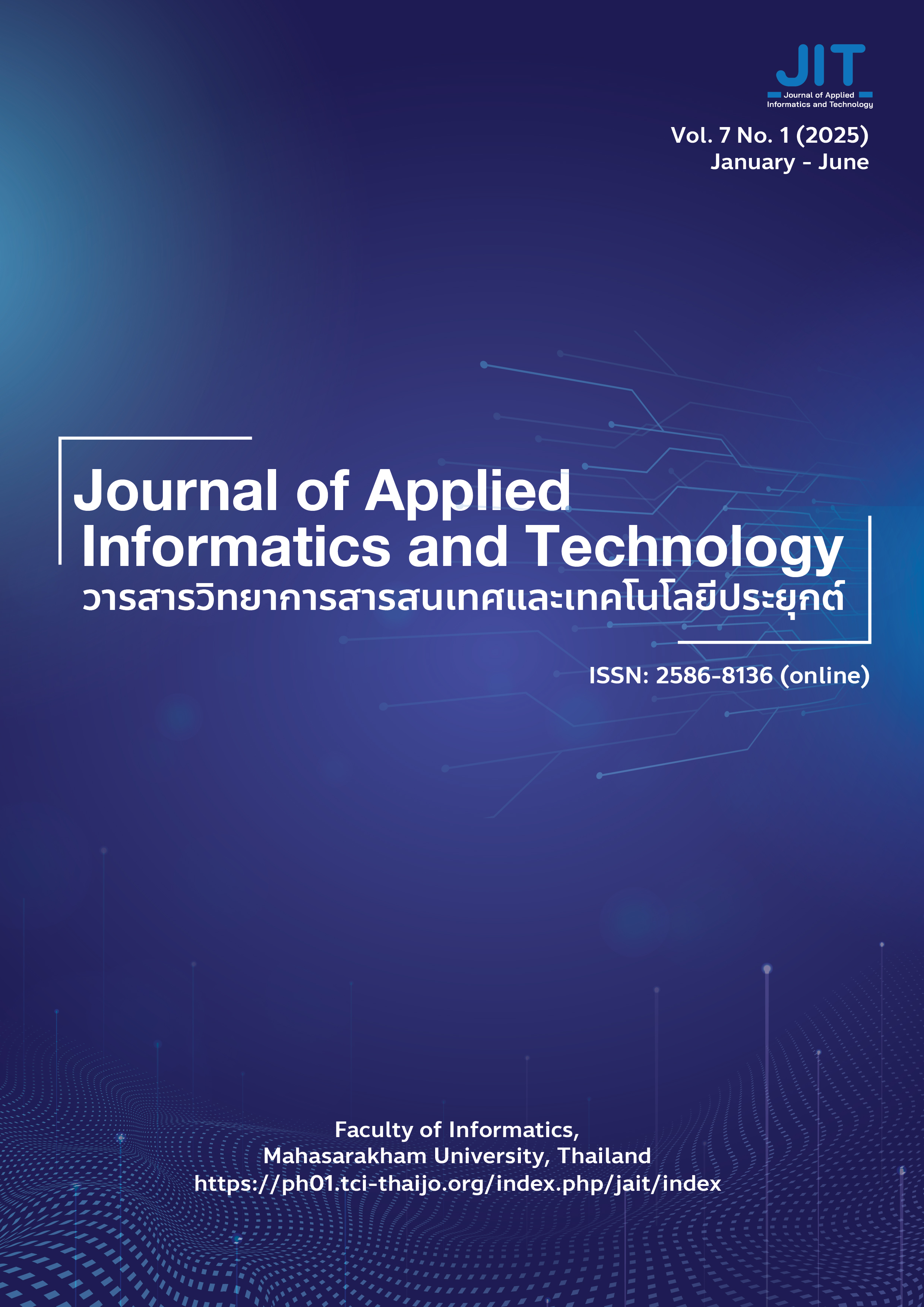ปัจจัยที่มีผลต่อความชื่นชอบเกมบนมือถือสำหรับคนรุ่นแอลฟา โดยใช้กรอบการวิเคราะห์เกมแบบเอ็มดีเอ
Main Article Content
บทคัดย่อ
การวิจัยในครั้งนี้มีจุดประสงค์เพื่อ 1) วิเคราะห์องค์ประกอบการออกแบบเกมมือถือ โดยใช้กรอบการวิเคราะห์เกมแบบเอ็มดีเอ 2) ศึกษาปัจจัยที่มีผลต่อความชื่นชอบเกมบนมือถือสำหรับคนรุ่นแอลฟา โดยใช้เกมมือถือ Subway Surfers เป็นกรณีศึกษา ได้มาจากการคัดเลือกเกมแบบไม่มีค่าธรรมเนียมและมีกำหนดอายุผู้เล่นไม่เกิน 13 ปี ซึ่งเป็นเกณฑ์การจัดระดับเนื้อหาเกมที่เหมาะสมกับอายุของคนรุ่นแอลฟา โดยเป็นเกมยอดนิยมที่ตรงกันระหว่างระบบปฏิบัติการ Android และ iOS จากเว็บไซต์ IGN มีกลุ่มตัวอย่างคือ นักเรียนโรงเรียนอัสสัมชัญนครราชสีมา ภาคการเรียนที่ 2 ปีการศึกษา 2566 จำนวน 348 คน ด้วยวิธีการเจาะจงนักเรียนระดับชั้นประถมศึกษาตอนปลายเนื่องจากมีความสามารถใช้โทรศัพท์มือถือได้อย่างคล่องแคล่ว เครื่องมือที่ใช้รวบรวมข้อมูล คือ แบบสอบถามเกี่ยวกับปัจจัยที่มีผลต่อความชื่นชอบเกมมือถือ Subway Surfers ของคนรุ่นแอลฟา สถิติที่ใช้ในการวิเคราะห์ข้อมูล ได้แก่ ความถี่ และร้อยละ ผลการวิจัยพบว่า 1) การวิเคราะห์เกมมือถือ Subway Surfers ด้วยกรอบการวิเคราะห์เกมแบบเอ็มดีเอ สามารถจำแนกออกมาได้ 17 ปัจจัย โดยสามารถจัดกลุ่มตามองค์ประกอบด้านกฎกติกาและระบบพื้นฐานของเกมได้ 6 ปัจจัย ด้านแรงขับที่ทำให้ผู้เล่นแสดงพฤติกรรม 4 ปัจจัย และด้านสุนทรียศาสตร์ที่ก่อให้เกิดความสนุก 7 ปัจจัย 2) ปัจจัยที่คนรุ่นแอลฟาชื่นชอบมากที่สุด โดยมีค่าร้อยละมากกว่า 50 มีจำนวน 11 ปัจจัย ได้แก่ (1) ระบบการควบคุมที่เป็นมิตรและใช้งานง่าย (2) ความท้าทายจากการเล่นให้ได้นานที่สุดเพื่อได้คะแนนมากขึ้น (3) ฝึกประสาทสัมผัสของการใช้ตา มือ และการตัดสินใจ (4) ใช้การควบคุมตัวละครในการเล่นเกมจากประสบการณ์เดิมของผู้ใช้ (5) สีสันของรูปภาพภายในเกมสดใสสะดุดตา (6) ความท้าทายในการควบคุมตัวละครผ่านอุปสรรคไปให้ถึงจุดหมาย (7) เล่นเพื่อคลายเครียด (8) เล่นเพื่อฆ่าเวลา (9) การเคลื่อนไหวของตัวละครในเกมมีความสวยงาม (10) เสียงในเกมทำให้รู้สึกสนุกสนาน และ (11) เล่นได้โดยไม่มีการเชื่อมต่ออินเทอร์เน็ต ตามลำดับ
Article Details

This work is licensed under a Creative Commons Attribution-NonCommercial-NoDerivatives 4.0 International License.
ผู้แต่งจะต้องกรอกข้อมูลเพื่อโอนลิขสิทธิ์ (copyright) ให้กับวารสารวิทยาการสารสนเทศและเทคโนโลยีประยุกต์ ก่อนเผยแพร่บทความ โดยดูรายละเอียดเพิ่มเติมได้ที่ https://ph01.tci-thaijo.org/index.php/jait/copyrightlicense
References
Areekul, C. (2019). Alternative education: The important learning model for generation alpha. Journal of MCU Social Science Review, 8(3), 270–283. https://so03.tci-thaijo.org/index.php/jssr/article/view/204999 [In Thai]
BahÇekapili, E., Yildiz, M., Çiftci, E., & Karal, H. (2022). Examination of children’playing game tendencies and digital game preferences based on gender. Academia Eğitim Araştırmaları Dergisi, 7(1), 7-23. https://doi.org/10.53506/egitim.1076103
Dheandhanoo, T. (2014). สรุปบรรยาย MDA Workshop โดย Robin Hunicke ที่ศรีปทุมเมื่อวันที่ 10 กันยายน 2557 [Summary of the MDA Workshop lecture by Robin Hunicke at Sripatum on September 10, 2014]. Retrieved 8 April 2024, Retrieved from https://tuangd.com/2014/12/11/mda/ [In Thai]
Eser, S. (2023). Designing EdTech solutions for generation alpha: Importance of co-design. Retrieved 7 February 2024, Retrieved from https://monstar-lab.com/global/blog/edtech-solutions-for-generation-alpha-co-design
Fernando, P. A. & Premadasa, H. S. (2024). Use of gamification and game-based learning in educating Generation Alpha: A systematic literature review. Educational Technology & Society, 27(2), 114-132. https://www.jstor.org/stable/48766166
Gamingdose. (2020). ไขข้อข้องใจ เหตุใดคนบางกลุ่มถึงไม่ชอบเกมมือถือ [Answering the question: Why do some people dislike mobile games]. Retrieved 10 December 2023, Retrieved from https://www.gamingdose.com/feature/
ไขขอข้องใจ-เหตุใดคนบางก/ [In Thai]
Hosid, C. (2021). Generation alpha: Designing for the next generation of learners. Retrieved 7 February 2024, Retrieved from https://www.corgan.com/news-insights/2021/generation-alpha-designing-for-the-next-generation-of-learners
Hunicke, R., LeBlanc, M., & Zubek, R. (2004). MDA: A formal approach to game design and game research. In Proceedings of the AAAI Workshop on Challenges in Game AI, July, 2004, 4(1), 1722-1726. https://aaai.org/papers/ws04-04-001-mda-a-formal-approach-to-game-design-and-game-research/
Inplang, W. & Thongkam, J. (2020). Opinion analysis on PlayerUnknown's Battlegrounds (PUBG) mobile games using text mining. Journal of Science and Technology Mahasarakham University, 39(5), 523-531. https://li01.tci-thaijo.org/index.php/scimsujournal/article/view/235350 [In Thai]
Jha, A. K. (2020). Understanding generation alpha. Retrieved 1 August 2023, Retrieved from https://ssrn.com/abstract=3634094
Kirginas, S., Psaltis, A., Gouscos, D., & Mourlas, C. (2021). Studying children’s experience during free-form and formally structured gameplay. International Journal of Child-Computer Interaction, 28, 100248. https://doi.org/10.1016/j.ijcci.2021.100248
Kusuma, G. P., Wigati, E. K., Utomo, Y., & Suryapranata, L. K. P. (2018). Analysis of gamification models in education using MDA framework. Procedia Computer Science, 135, 385-392. https://doi.org/10.1016/j.procs.2018.08.187
McCrindle, M. & Fell, A. (2020). Top 10 Facts about GEN Alpha. In Understanding Generation Alpha. McCrindle Research Pty Ltd. https://www.academia.edu/43549036/GENERATION_ALPHA? auto=download&email_work_card=download-paper
Mixmaya. (2021). 6 หลักการน่ารู้ในการออกแบบเกม ทำอย่างไรให้ปัง [6 principles worth knowing in game design How to make it popular]. Mitmaya.Co.,Ltd. Retrieved 16 January 2024, Retrieved from https://www.mixmaya.com/1611032749 [In Thai]
Obias, R. (2023). 20 most popular android games to play right now (August 2023). Retrieved 1 August 2023, Retrieved from https://www.ign.com/articles/most-popular-android-games
Ouriques, L., Xexéo, G., & Barbosa, C. (2021). A proposal to model wargames in the MDA framework. In Anais Estendidos do XX Simpósio Brasileiro de Jogos e Entretenimento Digital, (pp. 1-9). Porto Alegre: SBC. https://doi.org/10.5753/sbgames_estendido.2021.19619
Ruangwet, P. (2023). Their World ว่าด้วยการออกแบบ Built Environment ให้เอื้อต่อชีวิตของเด็ก Gen Alpha ที่จะเติบโตเป็นประชากรหลักของโลกในอนาคตอย่างยั่งยืน [Their World about the Design of the Built Environment to Facilitate the Lives of Generation Alpha Children to Grow into the Main Population of the World in a Sustainable Future]. Retrieved 10 December 2023, Retrieved from https://readthecloud.co/architecture-and-city-for-gen-alpha/ [In Thai]
Rupp, M. A., Sweetman, R., Sosa, A. E., Smither, J. A., & McConnell, D. S. (2017). Searching for affective and cognitive restoration: examining the restorative effects of casual video game play. Human Factors, 59(7), 1096-1107. https://journals.sagepub.com/doi/abs/10.1177/0018720817715360
The Drum. (2022). What is generation alpha, and why is it the most influential generation in CX?. Retrieved 1 August 2023, Retrieved from https://www.thedrum.com/profile/infobip/news/gen-alpha-the-most-influential-generation-for-cx
Theppaitoon, M. (2019). Classification of 3D graphic styles and their optimization in learning game for children between 6 and 12 years old. Degree of Master of Science in Information Technology, Prince of Songkla University. [In Thai]
Tootell, H., Freeman, M., & Freeman, A. (2014). Generation alpha at the intersection of technology, play and motivation. 2014 47th Hawaii international conference on system sciences, Waikoloa, HI, USA, 2014, 82-90, https://doi.org/10.1109/HICSS.2014.19.
Tripathi, S. (2019). The digital youth’s personality and conscience versul their vision adjustment. Journal of Early Childhood Education Management, 1(1), 90-100. https://doi.org/10.14456/jecem.2019.8 [In Thai]
Winn, Y. C. (2022). ทำไมการเล่นเกมช่วยบรรเทาความเครียดได้ ? [Why can playing games help relieve stress?]. Retrieved 16 January 2024, Retrieved from https://news.seagm.com/ทำไมการเล่นเกมช่วยบรรเ/ [In Thai]

